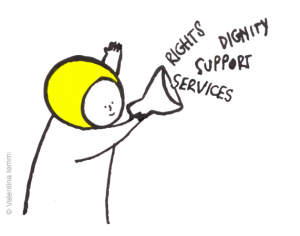World Health Organization Publishes Blog About My 40 Years in The Mad Movement
The World Health Organization (WHO), based in Switzerland, has a project Mental Health Innovation Network that is publishing brief online blog entries to promote “dignity” of mental health system users and psychiatric survivors.
Below is the blog by me that MHIN distributed, in which I looked back on four decades in The Mad Movement:
Psychiatric Survivor Story: 40 Years Witnessing Mental Health User Dignity
To mark this year’s WMHD, the Mental Health Innovation Network is running a month long series (#WMHD2015 Blog Series) highlighting dignity in four areas of global mental health where dignity is most often compromised and/or redeemed. This week’s subtheme is “Service User Advocacy”.
Share this blog on social media using the hashtag #WMHD2015 and our Twitter handle (@mhinnovation), and join the conversation by commenting below.
David Oaks is a service user advocate with over 40 years of experience in the field of mental health human rights. He is also the former Director of MindFreedom International. Contact him through Twitter or visit his website: http://davidwoaks.org
Last month I turned 60-years-old. Thankfully about 16 good friends, including my loving amazing wife Debra, made this transition fun. We gathered around a big table in a Sushi bar, drank Sake and ate chocolate cake.
This little party was very different from when I was 20, forty years ago, back in college. That is the year that I began to experience difficulties in my life that led to five stays in psychiatric institutions. About a dozen psychiatrists would diagnose me as psychotic, schizophrenic, clinically depressed, and bipolar (then called manic depression). More than once I would find myself in a solitary confinement room with just a bare mattress on the floor for a few days. More than once, about five staff would hold me down and forcibly inject me with a powerful psychiatric drug.
In my senior year, a college volunteer agency placed me as an intern for a mental health service user advocacy group. I wrote about this work for school, and this internship became my career for the next four decades. I have had the unique honor of watching thousands of other psychiatric survivors go through extreme and overwhelming states of mind, supporting one another as loving and equal peers, and thriving through the power of their human spirits.
Because of what many of us call “The Mad Movement” I have met with mental health consumer/user leaders in nine countries, poor and rich, who with allies in the mental health and legal communities, have reached out over and over again to anyone who would listen. While the details and exact perspectives of these service users are very diverse, I have heard some of these themes during my 40-year story:
1. Never giving up on reaching out for dialogue with mental health professionals.
In my own country, the USA, as well as many other countries, and internationally, I have seen psychiatric survivors and mental health consumers/users pull together and ask to have reasonable discussions with organizations representing psychiatrists and psychologists. Despite extreme human rights violations, including atrocities such as forced electroshock, unfair lock-ups for years, four-point and five-point restraints for days, etc., survivors have shown incredible self-discipline and resilience by successfully reaching out for dialogue with professionals.
Unfortunately, with some heartening exceptions, I have seen this outreach by consumers/users flatly ignored by national and global mental health professional organizations. Of course, only a percentage of mental health professionals engage in human rights violations. However, every single mental health professional has personal responsibility to make sure that groups representing them address human rights issues. I have had the pleasure of making friends with dozens of psychiatrists and psychologists who are concerned about our empowerment. But groups representing mental health professionals have been almost universally silent, from regional leaders to the top leaders.
2. Questioning the language that is used about us.
After attending hundreds of meetings of people who have personally experienced mental health care, it seems that many of our gatherings begin with a discussion about language. Some people might get a little frustrated because there does not seem to be any perfect words to describe us. However, this is not about “political correctness.” Instead, imperfect though this effort to redefine ourselves may be, our people are seeking their own empowerment and a first step is to address word issues.
People might accept or reject psychiatric diagnoses about themselves. People might accept or reject words the public assigns us. But we can have influence over the words we use for ourselves.
Are we psychiatric survivors? Mental health consumers? Service users? That is up to us to decide. In the meantime, how about we stop calling each other things like “normal” or “mentally ill.” Describing each other with unscientific, vague, disparaging labels can hurt our mental wellbeing.
3. We are the 100%!
One of the most effective ways to rob a group of their dignity is to segregate them and treat them unequally. As other advocates have shown, it is wonderful to celebrate differences between people in terms of color, culture, gender, background, etc. However, when differences are exaggerated irrationally and become walls, oppression can win.
The most difficult and the most valuable insight I have gotten from my four decades in The Mad Movement is that every human being, from womb to tomb, 24 hours a day, seven days a week, always wrestles with overwhelming, life-threatening mental and emotional challenges. Yes, we are all different. However, as the climate crisis is showing us all more each day, to be human is to deal with recovery from the mysterious, unknown difficulties of our minds.
Image courtesy of Valentina Iemmi



